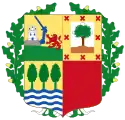Carlos Garaikoetxea
Carlos Garaikoetxea Urriza (born 2 June 1938) is a former Spanish politician from the Basque Country. He became the second elected Lehendakari (President of the Basque Autonomous Community), after José Antonio Aguirre, who had held that office in 1936-60.
Carlos Garaikoetxea Urriza | |
|---|---|
.jpg.webp) | |
| 3rd Lehendakari of the Basque Country | |
| In office 2 May 1979 – 26 January 1985 | |
| Vice President | Mario Fernandez (1979-1985) |
| Preceded by | Jesús María de Leizaola |
| Succeeded by | Jose Antonio Ardanza |
| Personal details | |
| Born | 2 June 1938 Pamplona, Navarre, Spain |
| Nationality | Spanish |
| Political party | PNV (until 1985), EA (1985 - ) |
| Spouse(s) | Sagrario Mina |
Early life
He was a leading figure in the Basque Nationalist Party (EAJ-PNV) of Navarre in the period 1975-80. In 1979, he was elected president of the Basque General Council, the provisional body preparing the devolution of powers to the Basque Country prior to the approval of the Statute of Autonomy. Once approved, Garaikoetxea was elected Lehendakari in 1980 and reelected in 1984.
During his presidency the Basque Statute of Autonomy was developed. As Lehendakari, Garaikoetxea inaugurated the radio-television public broadcast service EiTB on 31 December 1982. During his term, important self-government institutions were created: the Basque Public Health System (Osakidetza) and the Ertzaintza, the Basque police service, which was directed by his close collaborator Juan Porres Azkona from 1982 until 1986. During the floods of August 1983, he managed both Basque and Spanish emergency services in order to solve the resulting problems. The economy recovered through the revision of the Basque "Concierto Económico" and the Basque language was established throughout the Basque education system.
In 1985 nevertheless, major divergences with the direction of his party (Law of Historical Territories, personal clash with the president of the Basque Nationalist Party, Xabier Arzalluz, expulsion of all the organization in Navarre) created a major split within EAJ-PNV and Garaikoetxea, leading one of the factions (with greater support in Gipuzkoa, Navarre and Vitoria-Gasteiz, but not in Biscay nor the Araban countryside), he was replaced by José Antonio Ardanza in 1985. Soon after, the breach inside the party was complete and Eusko Alkartasuna was founded, with Garaikoetxea becoming its president and candidate to the Basque Presidency, a role that he held until 1999, when he retired from politics. He was elected as deputy in the Basque Parliament in all successive elections until 1998. He was also a Member of the European Parliament from 1987 to 1991.[1]
References
- "Lehendakaritza". Lehendakari.euskadi.net. Retrieved 2017-07-11.
External link
 Media related to Carlos Garaikoetxea Urriza at Wikimedia Commons
Media related to Carlos Garaikoetxea Urriza at Wikimedia Commons
| Preceded by Ramón Rubial Cavia |
President of the Basque General Council 1979-1980 |
Succeeded by The Basque General Council was succeeded by the Basque Government |
| Preceded by Jesús María de Leizaola |
Lehendakari (Basque President) 1980-1985 |
Succeeded by José Antonio Ardanza |
| Preceded by Manuel Ibarrondo |
President of Basque Solidarity (EA) 1986-1999 |
Succeeded by Begoña Errazti |
| Preceded by Jaak Vandemeulebroucke |
President of the European Free Alliance 1990-1991 |
Succeeded by Jaak Vandemeulebroucke |
